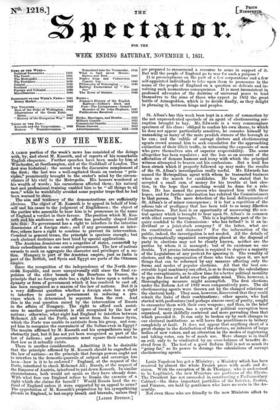St. Alban's has this week been kept in a state
of commotion by the not unprecedented spectacle of an agent of electioneering oor- ruption brought to bay. Mr. Edwards is a very commonplace specimen of his class : obliged to confess his own shame, to which he does not appear particularly sensitive, he consoles himself by unmasking as many of the more prudish sinners of the borough as he can ; and the rabble of corrupt electors and electioneering agents crowd around him to seek consolation for the approaching extinction of their illicit traffic, in witnessing the exposure of men who gave themselves airs of superior respectability. The scene altogether has been repulsive ; not the less so on account of the affectation of demure humour and irony with which the principal witness attempted to brazen out his confessions. -But a trail has been stritek which if properly followed up may make the results of the St. Alban's investigation really useful. Mr. Edwards has named the Metropolitan agent with whom he transacted business when on the search for candidates. He has stated that he accepted a small sum of money for his trouble at last elec- tion, in the hope that something would be- done for- a rela- tion. He has named the person who inspired him with these hopes, and for further information has referred the Commissioners that person. The mere detection of the local delinquencies of St. Alban's is of minor consequence ; it is but a repetition of the odious tale of profligacy that has been told to so many. Enaction Committees. But here is an opportunity of uncovering the cen- tral agency which is brought to bear upon St. Alban's in oomnion with other corrupt boroughs. This is a legitimate part of the in- quiry confided to the Commission : who has bribed ? is it an-in- dividual or a joint-stock company ? if the latter, what are its constitution and character ? For the information of the public, indeed, the investigation is not needed. All the details of the systematically organized corruption placed at the disposal of party in elections may not be clearly known, neither are the parties by whom it is managed ; but of its existence no one doubts. Yet precise information is required to deprive a majority of the Legislature of any pretext for ignoring it. The venality of electors, and the organization of those who trade upon it, are not things that can be reformed by any measure affecting only the forms and modes of popular elections. All that the best con- ceivable legal machinery can effect, is so to derange tho calculations of the corruptionists, as to allow time for a better political morality to gain the force of habit over the public mind. This, however, a thoroughgoing measure might accomplish. The first elections under the Reform Act of 1832 were comparatively pure. The old electioneering agents were thrown out by the changed relations of the electoral body. They soon, however, discovered that they could reknit the links of their combinations ; other agents, who had started with professions (and perhaps sincere ones) of purity, sought to encounter them with their own weapons ; and thus, in the brief space of twenty years, has a system of political corruption been organized, more skilfully contrived and more pervading than that which preceded it. It can only be broken up by such changes in our electoral institutions as will leave the practitioners in bribery completely at fault. It does not appear that anything short of a great change in the distribution of the electors, an infusion of large bodies of new voters, and an alteration in the modes of registering and taking votes, can be of much use. Mere change is in itself an evil, only to be vindicated by an over-balance of benefits de- rived from it. The test of a good Reform Bill is not so much its "going far," as its power to tlerange the calculations of corrupt electioneering agents.


























